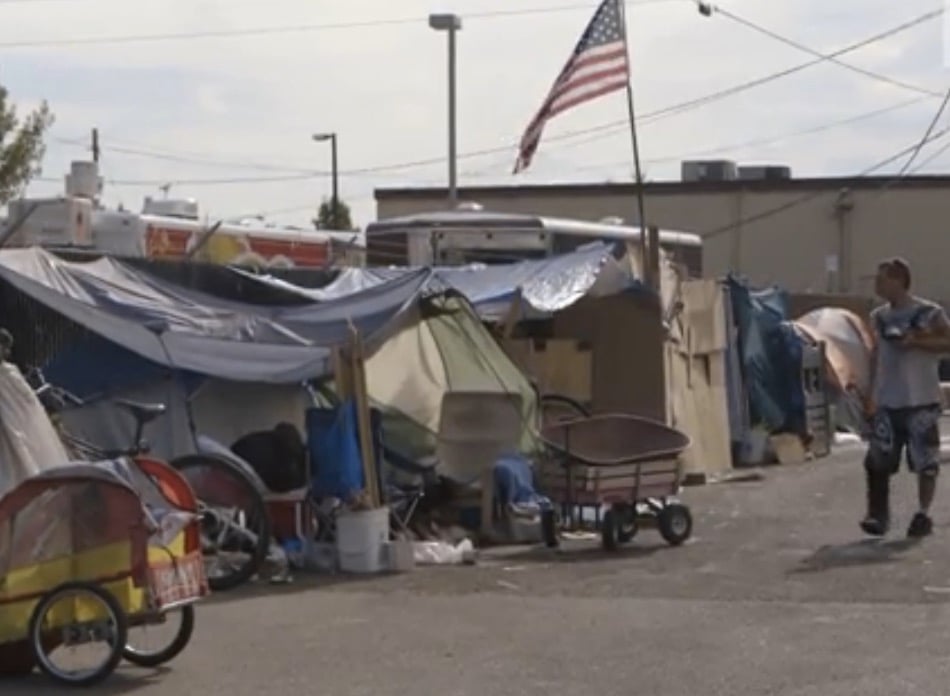Though the worst of the economic crisis may be over, an estimated 3.5 million people will experience homelessness in the United States at some point this year, despite the presence of programs aiming to get homeless people back on their feet. Many states have responded to this high number by passing legislation to criminalize homelessness rather than help. Dozens of states around the country have created new laws that make it virtually illegal to be homeless, ticketing people for acts like sleeping in public, sharing food, and even something as minute as sitting down for an extended period of time.
Idaho ranks 24th in the nation for its homeless population per capita. The state’s capital, Boise, can has a homeless count that can exceed 2000 people per night, but it’s shelters have a mere 300 beds. Despite this discrepancy, Boise is one of the cities that have created laws criminalizing homelessness. A new Vice documentary highlights a group of six homeless people who have sued the city, claiming that these laws constitute cruel and unusual punishment.
Janet Bell, a Boise resident, is one of those individuals. Bell, who has been homeless for over a decade, lost her arm to an infection while living on the streets. While on a railroad bridge, Bell and a companion were each written two tickets for sleeping outside. Bell spoke to the true purpose of these laws, stating, “The law? To harass the homeless in hopes that the homeless will go somewhere else. Of course, everybody wants to move the homeless, but they gotta be somewhere, don’t they?”
Bell’s case against the city has been brought to a federal appellate court and could redefine the rights of the homeless populations in cities nationwide.
Other cities, such as Salt Lake City, have created innovative ways to fight back against homelessness. Previously, Salt Lake was one of the hundreds of American cities that criminalized homelessness. Officials took a look at the cost of keeping the homeless population homeless and discovered a surprising fact. The city was spending $20,000 per homeless resident per year—spent on funding for policing, arrests, jail time, shelter, healthcare, and emergency services—numbers that have been echoed by numerous other studies.
Instead, for a mere $7,800 a year, the city could provide a person with an apartment and case management services. As a result, chronic homelessness dropped over 72 percent.
It’s clear that there are better and more effective ways to deal with homelessness, and yet the state continues to come up with archaic solutions to solve the problem. Last year, Rhodes Skate Park was given a $1.25 million facelift, which many locals believe to be a thinly veiled excuse to displace a homeless camp that resided there. Today, city officials shut down a homeless camp behind Interfaith Sanctuary, where roughly 135 homeless people had made a temporary camp, actions that were harshly critiqued by the state’s ACLU:
“What we saw today in Boise is government at its most shameful. Government should be open, transparent, and democratic. … The planning was done behind closed doors, to intentionally keep the broader community out,” Executive Director Leo Morales said. “… We have seen this kind of government displacement before in American history, and it has always been shameful. The city cannot spin its way out of the cruel bottom line: today, it destroyed a community using totalitarian tactics.”
Despite local protests, the camp is expected to be shut down before Saturday, with police noting that arrests may be necessary in some cases.
It’s unclear what the future holds for the state’s homeless population. Despite not having the means to house or shelter the homeless population, the city has done its best to criminalize basic behaviors for people who don’t have the means to rise outside of their cyclical poverty. With any luck, Bell and the group of people suing the city will have their day in court.
Danika is a musician and writer from the northwest. You can listen to her musichere, read her work here, or laugh at her slew of her bad selfies here.
—Please make note of The Mary Sue’s general comment policy.—
Do you follow The Mary Sue on Twitter, Facebook, Tumblr, Pinterest, & Google +?








